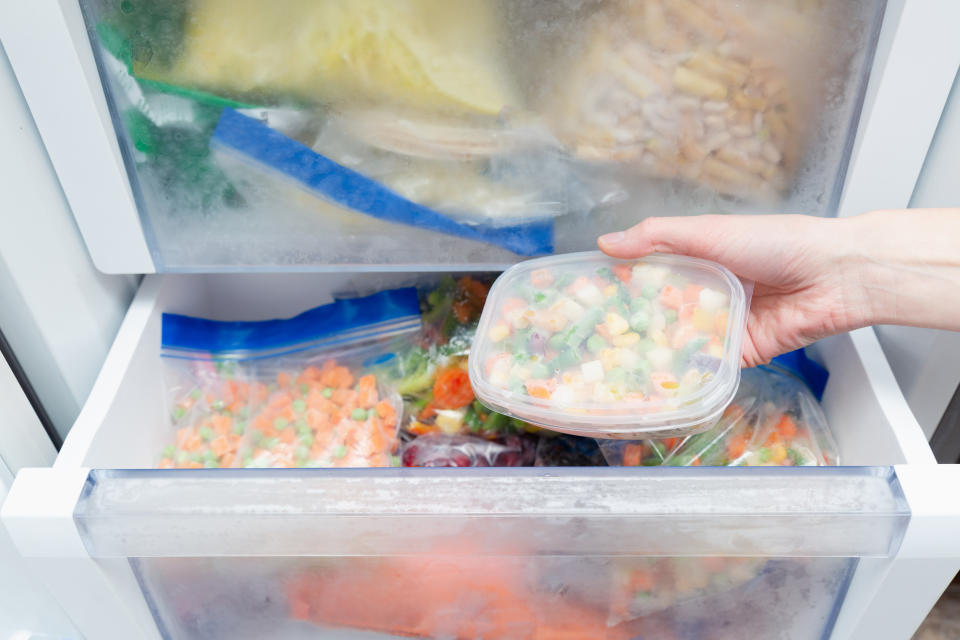What you actually need to stockpile for two weeks in self-quarantine
As supermarket shelves are stripped bare of everything from toilet paper to hand sanitiser and rice, many people are asking what we actually need to be stockpiling as coronavirus fears grow.
With over 100 cases of COVID-19 now confirmed in Australia, Yahoo Lifestyle spoke with four nutritionists about the best pantry and fridge items to stock up on, just in case you have to self-quarantine at home for two weeks.
Instead of rushing out and spending your hard-earned cash on a heap of items you’ll push to the back of your cupboard and never use, here’s the food that’ll actually get you through the epidemic, according to the experts.

Go back to basics
It can be easy to get consumed by the ‘panic-buying’ but nutritionists are urging people to take a look in their pantries and write down what they really think they’ll use and need during a self-isolation.
They believe things you should make sure you’ve got enough of are items like canned tomatoes (to use as a base for meals), stock cubes (for making soup and as a base for meals), rice, wholewheat pasta, quinoa and plenty of nuts and seeds to snack on.
Nutritionist Rick Hay recommends getting some superfood powders like acai or spirulina, which can be added to smoothies to increase vitamin and mineral intake and rolled oats for porridge, which can be made with water if your milk runs low.
If you’ve got food intolerances or need to steer clear of certain foods, the nutritionists recommend making sure you’ve got enough of alternative products, such as almond meal or gluten-free flour so you can make yourself a snack without needing to leave the house.
When it comes to adding flavour to food nutritionist Jacinta Callaghan says that spices are a given in any pantry and people should already be stocked up on them.

Quality protein
Scrap the processed food because nutritionists recommend packing your fridge and freezer full of quality protein so you can stay on top of your body’s daily needs.
As an essential macronutrient, they believe it’s pretty important you’re meeting your protein goals and according to Jacinta Callaghan, you should spend your money on chicken, meat and fish, as well as eggs, seeds, nuts, beans and legumes.
Nutritionist Rick Hay agrees, saying things like chickpeas, tofu, baked beans lentils and even protein powder should also be at the top of your shopping list.
Fresh food
While it might be tempting to pack your shelves full of tinned fish and frozen ready meals nutritionist Tracie Connor reckons nothing beats fresh fruit and vegetables for keeping your immune system in check.
“I think it’s important for people not to steer away from fresh food because they’re so filled with nutrients,” Tracie said.
Tracie reckons this time can really test people’s cooking skills, so buying items like eggs, flour and cheese, which can last weeks in the fridge or pantry are great for whipping up numerous recipes with.
Jacinta Callaghan agrees, urging people to pick vegetables in the supermarket that have longevity, such as potatoes, sweet potatoes, carrots and onions, which will usually last a few weeks if they’re stored right.

Make use of your freezer
Fresh food is key if you’re to get all your nutrients in during a quarantine period but that doesn’t have to mean you’re rushing out to the shops every day.
If you find some of your fruit and vegetables are starting to perish, Tracie Connor recommends cutting them up, putting them into ziplock bags and popping them in the freezer.
“The beauty is a lot of healthy foods can be frozen. Don’t limit buying fresh food. Even frozen fruits. They might perish on the bench but if you freeze them and then you can add them to things like smoothies,” she said.
Jacinta agrees, saying that after fresh vegetables, frozen veggies are the next best way to boost your immune system, as long as you don’t overcook them.
She also recommends pre-cooking some healthy meals packed with fresh vegetables and freezing them so you have a balanced diet if you’re forced into quarantine at a later date.
“You’re going to lose some of the nutrients but it’s better than the already frozen options in the supermarkets and a lot less sodium,” she said.
If you’re looking for frozen meal ideas, nutrition coach Anna Block says she always turns to chilli con carne made from organic mince, carrots beans and onion with a tomato puree sauce and paprika and cumin.
Another winner for her is a minestrone soup packed with fibre rich vegetables which can be frozen for about a month.

Stay healthy
As we go into cold and flu season, every nutritionist we spoke with recommended people take care of themselves by upping their daily doses of Vitamin C.
Food like oranges, broccoli, blackcurrants, kale and strawberries are packed full of Vitamin C, but Rich Hay reckons it wouldn’t be the worse idea to invest in some powder supplements.
Omegas, Zinc and Vitamin D are also vital for helping your body fight off any viruses.
Got a story tip or just want to get in touch? Email us at lifestyle.tips@verizonmedia.com.

 Yahoo Lifestyle
Yahoo Lifestyle 



